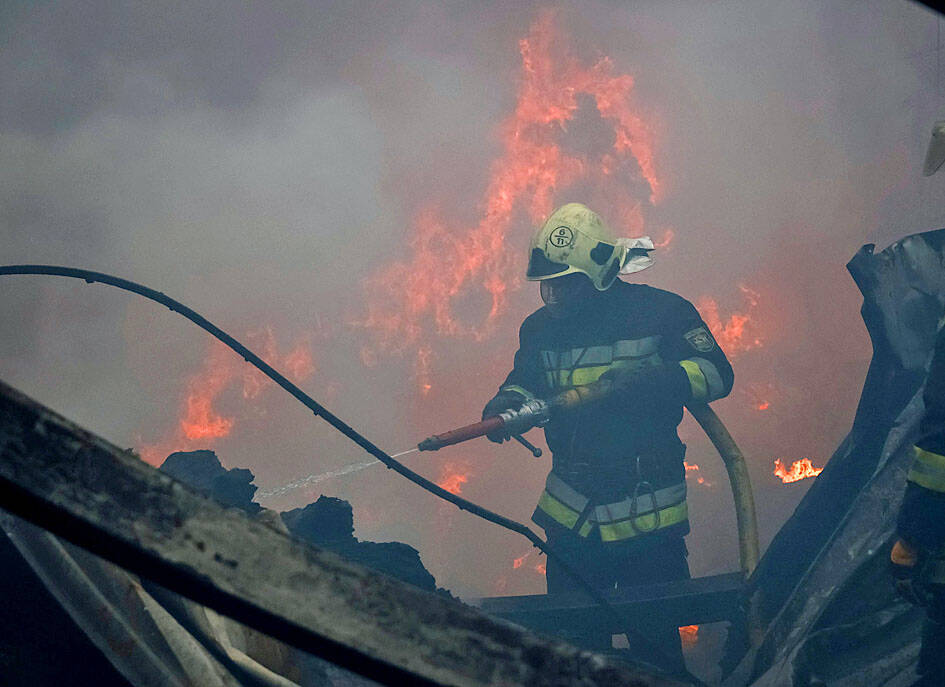Russia yesterday said that there are currently no plans for a call between Russian President Vladimir Putin and US President Donald Trump, after Trump warned he might send Tomahawk missiles to Ukraine.
Trump has been mulling potential supplies of the long-range missiles to Kyiv via European allies since his meeting with Putin in Alaska in August failed to produce a peace deal.
He on Sunday said that he might warn Putin about the possible deliveries if Russia does not halt its offensive, but Kremlin spokesman Dmitry Peskov told reporters: “There are no clear agreements on a phone conversation yet.

Photo: Reuters
“There are many opportunities for promptly organizing such a conversation,” if it was needed, he said.
Russia has repeatedly said it would see supplying the weapon as a significant escalation.
The missiles have a range of 2,500km, putting much of western Russia, including the capital, Moscow, within striking distance.
They are also technically capable of carrying nuclear warheads and Moscow said it would treat any launches of the missile as if they were loaded with a nuclear weapon.
Former Russian president Dmitry Medvedev, now a deputy chair of Russia’s security council, yesterday said that if the US opted to supply the weapons, it could backfire on Trump directly.
“The delivery of these missiles could end badly for everyone. And above all, for Trump himself,” he wrote on Telegram.
Trump and Medvedev, known for his hawkish and provocative anti-Western comments, in August clashed after the US leader upped his pressure on Moscow to halt its offensive in Ukraine.
Trump responded by redeploying military submarines and warning that Medvedev’s statements could “lead to unintended consequences.”

The US government has signed defense cooperation agreements with Japan and the Philippines to boost the deterrence capabilities of countries in the first island chain, a report by the National Security Bureau (NSB) showed. The main countries on the first island chain include the two nations and Taiwan. The bureau is to present the report at a meeting of the legislature’s Foreign Affairs and National Defense Committee tomorrow. The US military has deployed Typhon missile systems to Japan’s Yamaguchi Prefecture and Zambales province in the Philippines during their joint military exercises. It has also installed NMESIS anti-ship systems in Japan’s Okinawa

‘WIN-WIN’: The Philippines, and central and eastern European countries are important potential drone cooperation partners, Minister of Foreign Affairs Lin Chia-lung said Minister of Foreign Affairs Lin Chia-lung (林佳龍) in an interview published yesterday confirmed that there are joint ventures between Taiwan and Poland in the drone industry. Lin made the remark in an exclusive interview with the Chinese-language Liberty Times (the Taipei Times’ sister paper). The government-backed Taiwan Excellence Drone International Business Opportunities Alliance and the Polish Chamber of Unmanned Systems on Wednesday last week signed a memorandum of understanding in Poland to develop a “non-China” supply chain for drones and work together on key technologies. Asked if Taiwan prioritized Poland among central and eastern European countries in drone collaboration, Lin

NO CONFIDENCE MOTION? The premier said that being toppled by the legislature for defending the Constitution would be a democratic badge of honor for him Premier Cho Jung-tai (卓榮泰) yesterday announced that the Cabinet would not countersign the amendments to the local revenue-sharing law passed by the Legislative Yuan last month. Cho said the decision not to countersign the amendments to the Act Governing the Allocation of Government Revenues and Expenditures (財政收支劃分法) was made in accordance with the Constitution. “The decision aims to safeguard our Constitution,” he said. The Constitution stipulates the president shall, in accordance with law, promulgate laws and issue mandates with the countersignature of the head of the Executive Yuan, or with the countersignatures of both the head of the Executive Yuan and ministers or

CABINET APPROVAL: People seeking assisted reproduction must be assessed to determine whether they would be adequate parents, the planned changes say Proposed amendments to the Assisted Reproduction Act (人工生殖法) advanced yesterday by the Executive Yuan would grant married lesbian couples and single women access to legal assisted reproductive services. The proposed revisions are “based on the fundamental principle of respecting women’s reproductive autonomy,” Cabinet spokesperson Michelle Lee (李慧芝) quoted Vice Premier Cheng Li-chiun (鄭麗君), who presided over a Cabinet meeting earlier yesterday, as saying at the briefing. The draft amendment would be submitted to the legislature for review. The Ministry of Health and Welfare, which proposed the amendments, said that experts on children’s rights, gender equality, law and medicine attended cross-disciplinary meetings, adding that